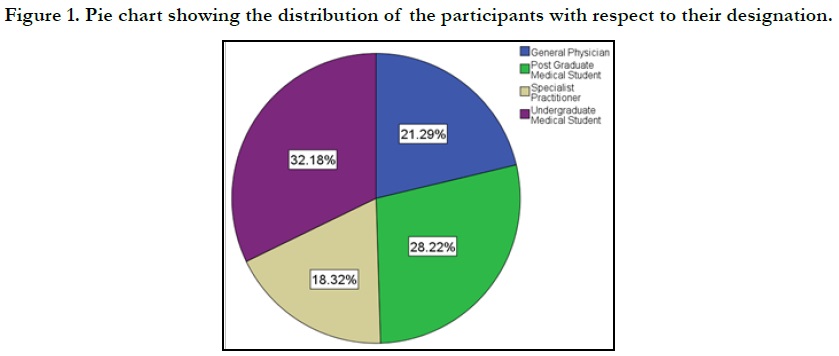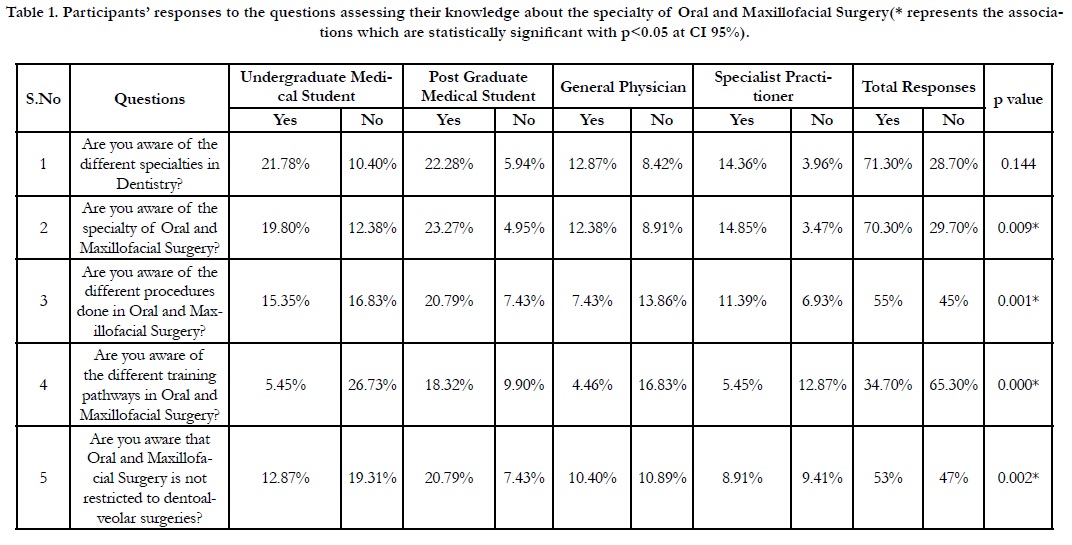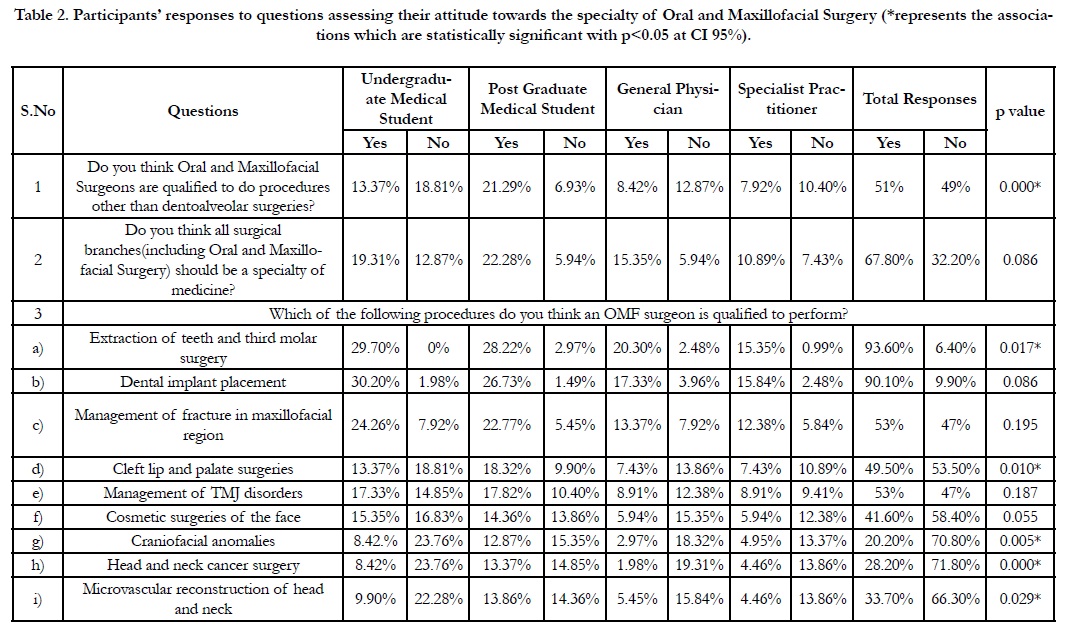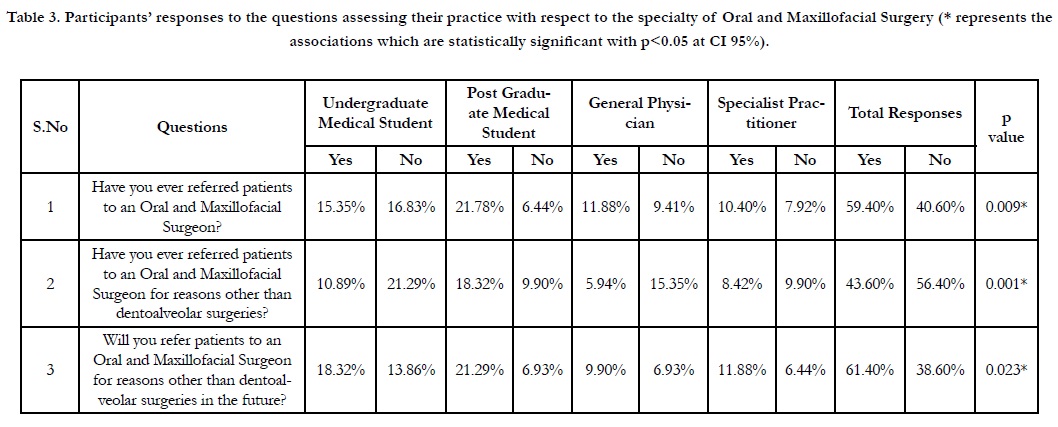Awareness About the Specialty of Oral and Maxillofacial Surgery among the Medical Fraternity in South India: A KAP Survey
Dyna Albert1*, MR Muthu Sekhar2
1 Post Graduate Student, Deparment of Oral and Maxillofacial Surgery, Saveetha Dental College, 162, Poonamallee High Rd, Velappanchavadi, Chennai,
Tamil Nadu 600077, India.
2 Director of Programme, Deparment of Oral and Maxillofacial Surgery, Saveetha Dental College, 162, Poonamallee High Rd, Velappanchavadi, Chennai,
Tamil Nadu 600077, India.
*Corresponding Author
Dyna Albert,
Post Graduate Student, Deparment of Oral and Maxillofacial Surgery, Saveetha Dental College, 162, Poonamallee High Rd, Velappanchavadi, Chennai, Tamil Nadu 600077, India.
Tel:+91 6380742675
E-mail: dyn.albrt@gmail.com
Received: September 18, 2020; Accepted: October 07, 2020; Published: November 12, 2020
Citation:Dyna Albert, MR Muthu Sekhar. Awareness About the Specialty of Oral and Maxillofacial Surgery among the Medical Fraternity in South India: A KAP Survey. Int J Dentistry Oral Sci. 2020;7(11):1027-1031. doi: dx.doi.org/10.19070/2377-8075-20000203
Copyright: Dyna Albert©2020. This is an open-access article distributed under the terms of the Creative Commons Attribution License, which permits unrestricted use, distribution and reproduction in any medium, provided the original author and source are credited.
Abstract
Introduction: Oral and maxillofacial surgery (OMFS) is one of the oldest specialties of dentistry and is often considered as a
bridge between medicine and dentistry. Yet, the specialty is less popular among both the general public and the non-dental healthcare
professionals when compared to other surgical specialties.
Methodology: A questionnaire survey was conducted to better understand the knowledge, attitude and practice of medical professionals
with respect to the specialty of OMFS in South India. It included 19 questions exclusive of demographic data and 202
medical students and practitioners participated in the survey.
Results: Majority of the participants acknowledged the expertise of an OMF surgeon in performing routine dentoalveolar procedures
and treating maxillofacial trauma while they were skeptical about the surgeon’s ability to perform other supposedly complex
procedures. Their overall awareness about the specialty was low.
Conclusion: It is not only important to educate the general public about the specialty but also promote the scope of OMFS
among other healthcare communities and establish an unprejudiced understanding and recognition of each specialty's contribution
in healthcare.
2.Introduction
3.Methodology
4.Results
5.Discussion
6.Conclusion
7.Refereces
Keywords
Awareness; Oral and Maxillofacial Surgery; Medical Fraternity; Medical Professionals.
Introduction
The roots of Oral and maxillofacial Surgery (OMFS) is a very deep
one dating back to the genesis of medicine and surgery itself, with
the literary works of Hippocrates, Aristotle and Sushruta describing
dental extractions and wiring techniques for maxillofacial fracture
management [1, 2]. Thoma in his 1957 paper titled “History
of Oral Surgery; the Oldest Specialty of Dentistry” nonchalantly
mentions the disinterest of many medical practitioners during the
19th century to treat diseases and conditions of the oral cavity
due to their non-urgent or not-so-life-threatening nature and also,
the possibility of a resultant facial deformity which would leave
the operator open to criticism [3]. The fairly limited pursuers who
dared to treat conditions of the mouth laid the foundations to the
specialty which would later be named as Oral Surgery by James E
Garretson and subsequently to Oral and Maxillofacial Surgery in
1975 by the American Association [3, 4]. Yet, even with the contributions
of many eminent surgeons in the field who have strived
to provide a better understanding of the specialty, till today the
specialty of OMFS remains a debatable one which is evident in
the difference in its training pathway around the world [5]. Additionally,
there is a grayness that exists among the general public
and the health professionals in the understanding of the specialty
[6, 7]. Farooq et al., in 2013 described OMFS as a lost tribe and
noted the lack of awareness among the general public about the
specialty of OMFS due to its shared anatomical areas of interest
with other specialties like Plastic Surgery and Ear Nose and
Throat (ENT) Surgery [8]. Subashraj K et al in 2008 also mentioned
a similar ignorance towards the specialty among the medical
communities in comparison to the dental communities [9].
Though the scope of the specialty is vast, beginning humbly from dental extractions to more complex craniofacial and microvascular
procedures, most of the OMF surgeons restrict their practice
to minor oral surgeries due to the shortage in opportunity as the
anatomy of interest is being overlapped with other medical specialties
[10, 12]. This is also attributed to the relative recentness
of the specialty compared to other surgical fields and also the traditional
hesitance to correlate dentistry with surgery which exists
among the general public and the medical practitioners [13]. Some
countries have attempted to resolve this hesitation by pedestalling
OMFS as a specialty which requires both medical and dental
degrees but less successfully so, as the grayness among the general
public and medical fraternity continues to exist. The problem is
only further escalated in developing countries like India [5, 8-14].
Nonetheless, as partners in providing healthcare to the patients, it
would only be fair for the medical and dental fraternities to function
together and recognise the contribution of the other without
prejudice [15].
In this study, we aim to assess the awareness of the specialty of
OMFS among the medical fraternity in South India in an attempt
to better understand the current scenario in South India.
Methodology
The proposed survey was conducted after receiving the approval
from the University Institutional Review Board.
To understand the awareness of the medical professionals about
the specialty of oral and maxillofacial surgery with respect to
knowledge, attitude and practice, an electronic survey was conducted
using an online portal which was distributed in the form
of a web link. Clicking on the link led users to an online structured
questionnaire written in English consisting of 19 questions
excluding the demographic data. For convenience sake, the
questions were categorised into the following: (1) Demographic
data (2) Knowledge about the specialty of oral and ,maxillofacial
surgery (3) Attitude towards the specialty of oral and maxillofacial
surgery (4) Practice ideologies of the medical professionals
with respect to the specialty of oral and maxillofacial surgery.
The questions were framed in multiple choice format and the respondents
were asked to choose the most appropriate response.
An individual could only submit the form once and their response
was non-modifiable after submission. The participation was voluntary
and anonymous.
Only medical practitioners and students pursuing medicine at the
time of survey were included in the study.
Medical students in their first or second year of study who were
not sufficiently exposed to the clinical environment were excluded
from the study in an attempt to avoid bias.
The survey responses were tabulated in Excel Datasheet and was
statistically analysed with SPSS Version 20 Software using descriptive
statistics while the strength of association was measured using
Pearson’s Chi Square Test at Confidence Interval (CI) 95%
where p<0.05 was considered statistically significant.
Results
A total of 207 responses were collected of which 5 responses
were excluded, due to incompletion of the form. The remaining
202 responses were assembled and included in the study. Of
the participants, 32.18% were undergraduate medical students,
28.22% were postgraduate medical students, 21.19% were general
physicians and 18.32% were specialist practitioners (Fig 1).
The non-demographic questionnaire responses were grouped, analysed and interpreted as follows:
These questions assessed the knowledge of the participants about
the specialty of oral and maxillofacial surgery.
Among the participants, only 71.3% were aware of the different
specialties in dentistry while 28.7% were ignorant of it. When
asked if they were aware of a specialty called OMFS, only 70.3%
of them responded positively while 29.7% of them gave a negative
response. Of the participants, 55% of them professed to be aware
of the different procedures done in OMFS while 45% of them
were unaware. Moreover, only 34.7% of them were aware of the
different training pathways in OMFS while 65.3% of them were still ignorant of the same. Only 53% of the participants seemed
to know that OMFS was not restricted to dentoalveolar surgeries
while 47% had a misconception that OMFS only pertains to dentoalveolar
surgeries. The association between the designation of
the participants and their knowledge about the specialty of Oral
and Maxillofacial Surgery is illustrated in Table 1 where p< 0.05 at
CI 95% is considered to be statistically significant.
Table 1. Participants’ responses to the questions assessing their knowledge about the specialty of Oral and Maxillofacial Surgery(* represents the associations which are statistically significant with p<0.05 at CI 95%).
These questions assessed the attitude of the participants towards
the specialty of oral and maxillofacial surgery.
Among the participants, 51% of them thought that OMF surgeons
were qualified to perform procedures other than dentoalveolar
surgeries while 49% of them thought otherwise. Expectedly,
67.8% of the participants thought that all surgical branches
including OMFS should be a specialty of medicine while 32.2%
of them did not think so. The question “Which of the following
do you think OMFS surgeons are qualified to manage/treat/
perform?” had 9 sub-questions ranging from extraction of teeth
to microvascular surgeries. 93.7% of the participants believed that
OMF surgeons were qualified to perform extraction of teeth and
third molar surgeries while interestingly 6.3% of them did not
believe so. Pertaining to placement of dental implants, 90.1% of
them believed an OMF surgeon was qualified to perform the procedure
while 9.9% of them did not think so. The opinion of the
participants was split with regard to cleft lip and palate surgeries,
TMJ surgeries and cosmetic surgeries. That is, of all the participants
only 46.5%, 53% and 41.6% of them believed that an OMF
surgeon was qualified to perform cleft lip and palate surgeries,
TMJ surgeries and cosmetic surgeries, respectively. With regard to
surgeries to treat craniofacial anomalies, only 29.2% of the participants
thought an OMF surgeon was qualified to perform the
procedure while 70.8% did not think so. Furthermore, only 28.2%
and 33.7% of the participants considered an OMF surgeon qualified
to perform head and neck cancer and microvascular surgeries
respectively. The association between the designation of the
participants and their attitude towards the specialty of Oral and Maxillofacial Surgery is illustrated in Table 2 where p< 0.05 at CI
95% is considered to be statistically significant.
Table 2. Participants’ responses to questions assessing their attitude towards the specialty of Oral and Maxillofacial Surgery (*represents the associations which are statistically significant with p<0.05 at CI 95%).
These questions assessed the practice of the participants with respect
to the specialty of oral and maxillofacial surgery.
Among the participants, only 59.4% of them have ever referred a
patient to an OMF surgeon and only 43.6% had referred for reasons
other than dentoalveolar surgeries. 61.4% of the participants
said that they will refer patients to an OMF surgeon for reasons
other than dentoalveolar surgeries in the future. The association
between the designation of the participants and their attitude towards
the specialty of Oral and Maxillofacial Surgery is illustrated
in Table 3 where p< 0.05 at CI 95% is considered to be statistically
significant.
Table 3: Participants’ responses to the questions assessing their practice with respect to the specialty of Oral and Maxillofacial Surgery (* represents the associations which are statistically significant with p<0.05 at CI 95%).
Discussion
A surgeon trained in OMFS is qualified not only to perform dentoalveolar
surgeries but also to surgically manage trauma and pathologies
pertaining to craniomaxillofacial region, treat diseases
of the temporomandibular joint (TMJ) and perform esthetic procedures
of the face inclusive of orthognathic and facial plastic
surgeries. With advanced training they can treat developmental
conditions of the craniomaxillofacial region with cleft and craniofacial
surgeries and perform surgical resection of head and neck
tumours followed by reconstruction with either local or microvascular
flaps. The training pathways of the specialty are varied in
different parts of the world [11, 16].
Oral and Maxillofacial Surgery is the only specialty to be regarded
as a bridge between medicine and dentistry. But uncannily, the
specialty is placed in an obscure ground where the dental fraternity
regards them as surgeons and the medical specialty as dentists
[17]. In India, the specialty is a part of dentistry, hence a relative
popularity of the specialty among the dentists when compared to their medical colleagues can be expected [9].
In our study, though many participants knew about the existence
of the specialty, half of them were ignorant about the procedures
performed and unaware that it was not restricted to dentoalveolar
surgeries. While a majority of them believed that any surgical
specialty should be part of medicine, nearly half of them considered
an OMF surgeon to be not sufficiently qualified to perform
procedures other than dentoalveolar surgeries. Majority of the
participants trusted an OMF surgeon's expertise in performing
dental extractions, third molar surgeries, dental implant placement
and maxillofacial trauma management while their opinion
was split when it pertained to management of TMJ disorders and
cosmetic surgeries of the face. A vast majority of the participants
did not trust an OMF surgeon's expertise in treating craniofacial
anomalies, head and neck cancer and performing microvascular
reconstructions. While more than half of the participants had at
least once referred a patient to an OMF surgeon, less than half
of them had referred for reasons other than dentoalveolar procedures
and a majority of them professed to do so only in the
future. Our attempt to identify any significant difference in the
responses of participants belonging to different designations (viz.
undergraduate students, post graduate students, general physicians,
specialist practitioners) lead to an innovative finding. The
postgraduate and undergraduate students were more aware of the
specialty when compared to the general physicians and specialist
practitioners and a statistically significant difference was noted
in most of their responses (p<0.05). This could be due to the
increasing popularity of multidisciplinary approach to patient
treatment which is becoming a part of the current training pattern
for the undergraduate and postgraduate students. This could
positively influence the awareness and acceptance of the specialty
of OMFS in the distant future.
Apart from the associative finding, the results of our survey are
not as surprising, with similar surveys conducted over time proving
the relative unpopularity of the specialty in the medical fraternity.
This simply shows the unchanging nature of the knowledge,
attitude and practice among the medical professionals. As OMF
surgeons, we must work towards familirasing the scope of our
specialty among the general public as well as among other healthcare
professionals. Reddy et al in 2011, discussed the importance
of a less complicated and a precisely descriptive name change for
the specialty which will easily reach out to the general public. Also,
they reiterated the necessity to upgrade the postgraduate training
process which will make the young and budding surgeons better
equipped and confident to perform non-dentoalveolar procedures
[17]. We insist on the same, and in addition, we believe a camaraderie
between the medical professionals and OMF surgeons
would indefinitely bridge the gap between medicine and dentistry.
Conclusion
Our study recapitulates the lack of awareness of the specialty of
OMFS in the medical fraternity. In a developing country such as
India where the awareness and importance given to oral health is
yet to improve, it is unrealistic to expect awareness of the specialty
among the general public when that of our medical fraternity
itself is low. Hence, educating medical students and practitioners
about the importance of oral health and more notably the recognition
of an OMF surgeon's ability in treating dental and non
dental diseases of the cranio-maxillofacial region and unprejudiced
referral when needed are crucial and would help to bridge
the gap between the medical and dental fraternities.
References
- Singh V. Sushruta: The father of surgery. Natl J Maxillofac Surg. 2017;8:1–3.
- Tiwari R, Pendyala C, Gurukarthik G, Bhattacharjee A. History of oral and maxillofacial surgery-a review. IOSR J. Dent. Med. Sci. 2017;16:99-102.
- THOMA KH. The history of oral surgery; the oldest specialty of dentistry. Oral Surg Oral Med Oral Pathol. 1957 Jan;10(1):1-10.Pubmed PMID: 13400472.
- Deranian HM. The transformation of the American Association of Oral Surgeons into the American Association of Oral and Plastic Surgeons. J Hist Dent. 2008;56(2):79-86.Pubmed PMID: 18807787.
- Kumar S. Training Pathways in Oral and Maxillofacial Surgery Across the Globe-A Mini Review. J Maxillofac Oral Surg. 2017 Sep;16(3):269-276. Pubmed PMID: 28717283.
- Goodson AM, Payne KF, Tahim A, Cabot L, Fan K. Awareness of oral and maxillofacial surgery as a specialty and potential career pathway amongst UK medical undergraduates. Surgeon. 2013 Apr;11(2):92-5.Pubmed PMID: 23062547.
- Alnofaie H, Alchawaf B, AlKindi M. Knowledge, awareness, and perception of oral and maxillofacial surgery among the public and professionals in Saudi Arabia: a cross-sectional study. Int J Oral Maxillofac Surg. 2019 Dec;48(12):1597-1603.Pubmed PMID: 31248704.
- Farook SA, Rihal K, Abdullakutty A, Coombes D. Lost tribe? Awareness of oral and maxillofacial surgery (OMFS) among the general public. Br J Oral Maxillofac Surg. 2013;51(1):e4–5.
- Subhashraj K, Subramaniam B. Awareness of the specialty of oral and maxillofacial surgery among health care professionals in Pondicherry, India. J Oral Maxillofac Surg. 2008 Nov;66(11):2330-4.Pubmed PMID: 18940501.
- Goss AN, Gerke DC. Effect of training on the scope of oral and maxillofacial surgery. Int J Oral Maxillofac Surg. 1990 Jun 1;19(3):184-9.
- Goss AN, Helfrick JF, Szuster FS, Spencer AJ. The training and surgical scope of oral and maxillofacial surgeons: the International Survey 1994. Int J Oral Maxillofac Surg. 1996 Feb;25(1):74-80.Pubmed PMID: 8833306.
- Nayak K. Oral and Maxillofacial Surgery: It's Future as a Specialty. J Maxillofac Oral Surg. 2011 Dec;10(4):281-2.Pubmed PMID: 23204740.
- Paul G. The future of maxillofacial surgery as a specialty of dentistry. J Oral Maxillofac Surg . 2017 Mar;16(1):1-2.
- Chiu GA, Muff D. International exchange in oral and maxillofacial surgery: comparison of the training pathways in the UK and USA at the end of the twentieth century. Br J Oral Maxillofac Surg. 2001 Dec 1;39(6):465-70.
- Ginzberg E, editor. Health services research: key to health policy. Harvard University Press; 1993.
- Hunter MJ, Rubeiz T, Rose L. Recognition of the scope of oral and maxillofacial surgery by the public and health care professionals. J Oral Maxillofac Surg. 1996 Oct;54(10):1227-32.Pubmed PMID: 8859242.
- Reddy K, Adalarasan S, Mohan S, Sreenivasan P, Thangavelu A. Are people aware of oral and maxillofacial surgery in India?. J Oral Maxillofac Surg. 2011 Sep 1;10(3):185-9.










